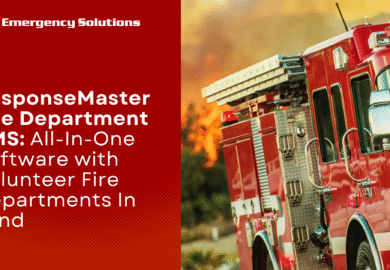
Enhancing Fire Department Financial Sustainability: Cost Recovery Strategies
Executive Summary:
The financial sustainability of fire departments is crucial for ensuring effective emergency response services to communities. With the increasing demands and costs associated with firefighting, cost recovery strategies have emerged as essential solutions for addressing critical financial needs. This report explores how implementing fire department cost recovery measures can alleviate financial strains and ensure the continued provision of high-quality emergency services.
Introduction:
Fire departments play a vital role in safeguarding communities from various emergencies, including fires, medical emergencies, natural disasters, and hazardous material incidents. However, providing these essential services comes with significant financial obligations. As budgets become tighter and demands increase, fire departments are seeking innovative approaches to generate revenue and maintain operational efficiency.
Importance of Cost Recovery:
Cost recovery refers to the process of recouping expenses incurred by fire departments through various means, such as fees for services rendered, reimbursement from insurance companies, grants, and partnerships. Implementing effective cost recovery strategies is essential for several reasons:
- Financial Sustainability: Cost recovery measures help fire departments cover operational costs, including equipment maintenance, personnel salaries, training, and infrastructure upgrades, ensuring financial sustainability in the long run.
- Resource Allocation: By generating additional revenue, fire departments can allocate funds to invest in advanced technology, specialized training, and modern equipment, thereby enhancing their capabilities and response effectiveness.
- Community Support: Implementing fair and transparent cost recovery policies can garner community support by demonstrating responsible fiscal management and ensuring equitable distribution of financial burdens.
- Service Enhancement: Adequate funding through cost recovery allows fire departments to expand their services, including community outreach programs, fire prevention education, and public safety initiatives, leading to a safer and more informed populace.
Key Cost Recovery Strategies:
Several cost recovery strategies can be implemented by fire departments to mitigate financial challenges:
- User Fees: Charging fees for emergency services, such as firefighting, emergency medical responses, hazmat incidents, and rescue operations, can help offset operational costs. These fees can be structured based on the type and extent of services provided, ensuring fairness and affordability.
- Insurance Reimbursement: Collaborating with insurance companies to facilitate reimbursement for emergency services provided to insured individuals can significantly contribute to revenue generation. This approach requires effective billing and documentation processes to streamline reimbursement procedures.
- Grants and Funding Opportunities: Actively seeking grants and funding opportunities from government agencies, non-profit organizations, and private entities can supplement fire department budgets, supporting specific projects, equipment purchases, and training initiatives.
- Public-Private Partnerships: Engaging in partnerships with businesses, industries, and community organizations can yield financial support, in-kind donations, and sponsorships for fire department activities, such as fundraising events, public awareness campaigns, and facility upgrades.
- Fee-for-Service Programs: Offering fee-based training programs, fire inspections, plan reviews, and other specialized services to businesses, homeowners, and governmental entities can diversify revenue streams and capitalize on the expertise of fire department personnel.
Case Studies and Best Practices:
Examining successful cost recovery initiatives implemented by other fire departments can provide valuable insights and best practices. Case studies showcasing innovative approaches, stakeholder engagement strategies, and measurable outcomes can guide the development and implementation of effective cost recovery plans.
The founders of Emergency Solutions, Inc. are firefighters themselves and have seen what the lack of funding can do to fire departments of all sizes. Not having enough money for day-to-day needs, equipment, training, new personnel, and apparatus is detrimental to the safety of firefighters and even the survival of fire departments.
The founders of Emergency Solutions, Inc. created ResponseMaster as an integral solution for fire departments to not only save on the cost of having to pay for multiple software integrations used to manage their station and respond to calls but also to recoup funds incurred by fire departments when responding to calls. ResponseMaster is an affordable, easy to use, all-in-one, fire department management and incident reporting software that does not require multiple costly integration tools and includes an automated, in-house, cost recovery program.
Conclusion:
In conclusion, fire department cost recovery is a vital solution for addressing critical financial needs and ensuring the sustainability of emergency services. By implementing a combination of user fees, insurance reimbursement, grants, partnerships, and fee-for-service programs, fire departments can enhance their financial resilience, improve service delivery, and strengthen community support. Strategic planning, stakeholder collaboration, and continuous evaluation are essential for maximizing the effectiveness of cost recovery strategies and maintaining the highest standards of emergency response capabilities.
Learn more about ResponseMaster and how ResponseMaster can save you on fire department software costs while also recouping expenses from responding to calls. Request a free demo and ask for case studies or references from current customers who are enjoying the huge value in ResponseMaster.
Recent Posts
Fire Department Software and Cost Recovery for Any Size Department
Recent Posts
- Fire Department Software and Cost Recovery for Any Size Department
- ResponseMaster Fire Department RMS: All-In-One Software with Volunteer Fire Departments In Mind
- Emergency Solutions, Inc. Launches New Referral Program
- Emergency Solutions, Inc. Launches Comprehensive Fire Department Cost Recovery System
- Fire Chief Fire Department Software Complaints


Recent Comments